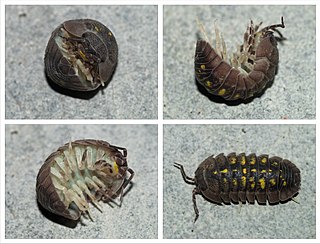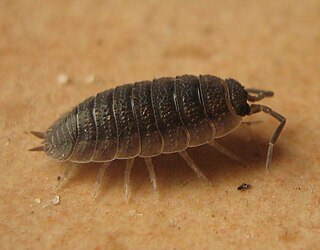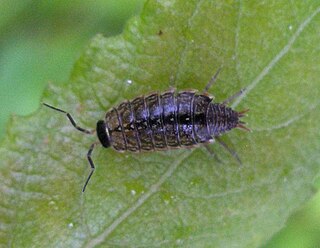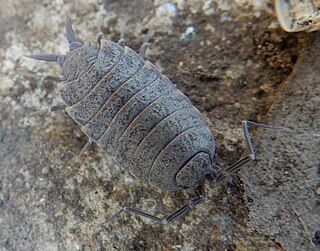
Armadillidium is a genus of the small terrestrial crustacean known as the woodlouse. Armadillidium are also commonly known as pill woodlice, leg pebbles, pill bugs, roly-poly, or potato bugs, and are often confused with pill millipedes such as Glomeris marginata. They are characterised by their ability to roll into a ball ("volvation") when disturbed.

Armadillidiidae is a family of woodlice, a terrestrial crustacean group in the order Isopoda. Unlike members of some other woodlice families, members of this family can roll into a ball, an ability they share with the outwardly similar but unrelated pill millipedes and other animals. This ability gives woodlice in this family their common names of pill bugs or roly polies. Other common names include slaters,potato bugs, butchy boys and doodle bugs. Most species are native to the Mediterranean Basin, while a few species have wider European distributions. The best-known species, Armadillidium vulgare, was introduced to New England in the early 19th century and has become widespread throughout North America.

Porcellionidae is a terrestrial family of the order Isopoda.

Haplophthalmus is a genus of woodlice in family Trichoniscidae. It contains 47 described species, of which two are listed as vulnerable species on the IUCN Red List – Haplophthalmus abbreviatus and Haplophthalmus rhinoceros.

Styloniscus is a genus of woodlice in the family Styloniscidae. It contains the following species as of 2010:

Porcellio is a genus of woodlice in the family Porcellionidae. These crustaceans are found essentially worldwide. A well-known species is the common rough woodlouse, Porcellio scaber.

Trichoniscidae are a family of isopods (woodlice), including the most abundant British woodlouse, Trichoniscus pusillus. Most species of woodlice that have returned to an aquatic or amphibian way of life belong to this family. Several species from the following genera live in water and on land: Titanethes, Cyphonetes, Alpioniscus, Scotoniscus, Bureschia, Brackenridgia, Mexiconiscus, Trichoniscoides, Cretoniscellus, Balearonethes and Cyphoniscellus.

Philosciidae are a family of woodlice. They occur almost everywhere on earth, with most species found in (sub)tropical America, Africa and Oceania, and only a few in the Holarctic.

Trichoniscus is a genus of woodlice. It contains over 100 species, including the common pygmy woodlouse, Trichoniscus pusillus:

Porcellionides is a genus of woodlice in the family Porcellionidae. It includes the following species :

Ligidium is a genus of woodlice. It contains about 46 species, six of which are probably taxonomic synonyms of Ligidium hypnorum or Ligidium germanicum. Of the remainder, eight species are found in North America, six in Japan, two in Taiwan, four in China, 12 in Turkey, the Caucasus, and Central Asia, and six in Greece.

Trachelipus is a genus of woodlice in the family Trachelipodidae, containing the following species:

Armadillidae is a family of woodlice, comprising around 80 genera and 700 species. It is the largest family of Oniscidea, and one of the most species-rich families of the entire Isopoda. Armadillids generally have a strongly convex body shape, with some rather shallowly convex. Like members of the woodlice family Armadillidiidae, armadillids are capable of enrolling into a sphere (conglobation), and are commonly known as pill bugs. Armadillids differ from the Armadillidiidae in that the antennae are fully enclosed within the sphere.
Scleropactidae is a family of woodlice, with a predominantly Gondwanan distribution. It contains the following genera:
Alloniscus is the sole genus in the woodlice family Alloniscidae. There are more than 20 described species in Alloniscus.

Armadilloniscus is a genus of woodlice in the family Detonidae. There are more than 30 described species in Armadilloniscus.

Platyarthrus is a genus of woodlice in the family Platyarthridae. There are more than 30 described species in Platyarthrus.
Alpioniscus is a southern European genus of woodlice in the family Trichoniscidae. Alpioniscus consists of two subgenera: Alpioniscus s.s. and Illyrionethes. A 2019 study used molecular and taxonomic analyses to verify the validity of the current taxonomy, resulting in the redescription of several species and the description of two new species.

Eubelidae is a family of isopods belonging to the order Isopoda. It contains the following genera:













